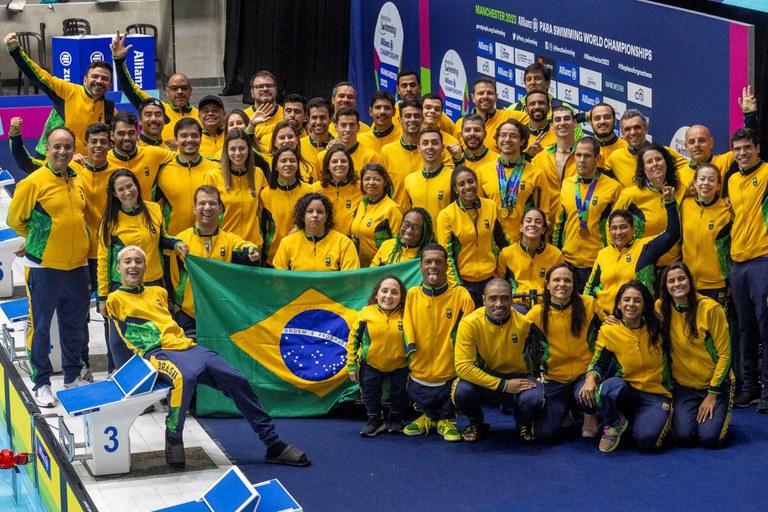
Brazilian Paralympic sport reached another milestone of excellence at the Swimming World Cup, which recently ended in Manchester, England. Of the 29 athletes from ten states sent by Brazil, 25 returned with medals, reinforcing the country's position as a power in this field.
Performance and achievements
Brazil accumulated a total of 46 medals, including 16 gold, 11 silver and 19 bronze, thus achieving fourth place overall in the medal table. This result placed the country ahead of powers such as Great Britain, behind only Italy, Ukraine and China.
Furthermore, the diversity of achievements was remarkable, with medals being distributed across 11 different categories. Both women and men contributed to this success, highlighting the strength and representation of Brazilian Paralympic sport around the world.
Successful partnership
A common point among the Brazilian athletes who reached the podium in Manchester was the partnership with Bolsa Atleta, a direct sponsorship program from the Federal Government for athletes. This investment has been fundamental in boosting athletes' careers, providing essential financial resources for their training and participation in high-level competitions.
Of the group of medalists, 24 belong to the Podium category, the main category of the program, which includes athletes who stand out among the 20 best in the world in their disciplines. Of these, 15 receive the scholarship ceiling of R$15,000 per month, demonstrating the program's commitment to supporting the best sporting talents in the country.

Impact on competitions
Highlighting the impact of Bolsa Atleta, we have the example of Maria Carolina Santiago, who reached the podium eight times in eight competitions, consolidating herself as the main medalist of the World Cup. This achievement not only highlights Carol Santiago's athletic excellence, but also highlights the program's crucial role in her sporting development and success.
Another important highlight is Edênia Garcia, who at 36 years old won her 19th medal at the Paralympic Swimming World Championships. Their inspiring journey and persistence in the face of physical difficulties demonstrate not only the strength of Brazilian Paralympic athletes, but also the importance of Bolsa Atleta's continued support in their careers.

Impact and recognition
The impact of Bolsa Atleta can be seen not only in the athletes' individual results, but also in Brazil's collective achievements in international competitions. In the last Olympics and Paralympics, the presence of scholarship holders was significant, representing the majority of podiums achieved.
This success reflects not only the talent and dedication of the athletes, but also the effectiveness of the program in providing essential financial support. With a record number of athletes eligible in 2023, Bolsa Atleta continues to play a fundamental role in the development of high-performance sport in Brazil, paving the way for future achievements and inspiring generations of sporting talent.
The sport needs more support at its base
The Brazilian Government's support for Paralympic athletes is a complex issue that involves several aspects. On the one hand, programs such as Bolsa Atleta represent an important mechanism of direct financial support for athletes, providing essential resources for their training and participation in high-level competitions. The increase in the number of athletes covered by the program and the record investment in 2023 demonstrate a commitment to strengthening high-performance sport in the country.
On the other hand, there are criticisms regarding the adequacy and sufficiency of this support, especially considering the specific needs of Paralympic athletes. Issues such as accessibility, adequate infrastructure for training and competition, medical and multidisciplinary support, among others, are still challenges to be faced.
Furthermore, there is a discussion about the need for more comprehensive and sustainable public policies for the development of Paralympic sport in Brazil, which go beyond individual financial support to athletes. This includes investments in accessible sports infrastructure, grassroots development programs and social inclusion through sport, among other initiatives.
Therefore, while Bolsa Atleta represents an important step in supporting Paralympic athletes, there is still room for improvement and for a broader discussion about the government's role in the development of adapted sport in Brazil.
Concluding the News
Brazil's impressive results at the Paralympic Swimming World Cup highlight not only the athletes' athletic excellence, but also the importance of Bolsa Atleta's continued support. As an integral part of the development of high-performance sport in the country, the program plays a crucial role in enabling athletes to reach their full potential and represent Brazil with pride in international competitions.
What is your opinion about the impact of Bolsa Atleta on Brazilian sport?


















































